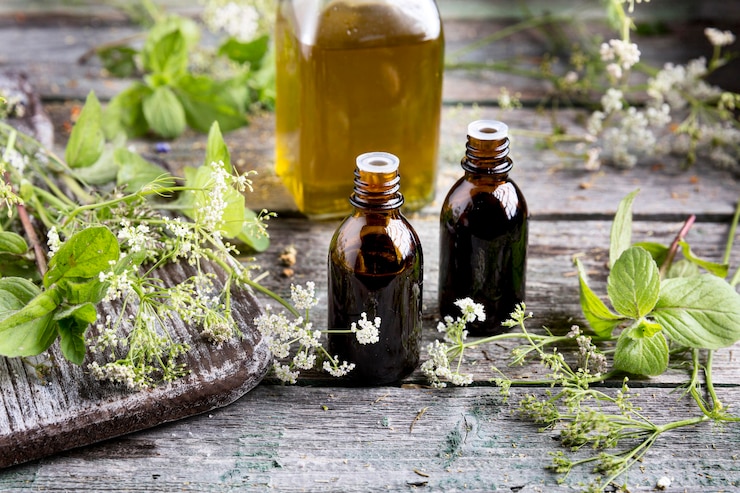
Essential oils have been used for ages to address various health issues, from relieving stress and sore muscles to easing skin irritations. In this guide, we’ll focus on how essential oils can help manage fever symptoms, highlighting their benefits and proper usage.
If you’re searching for a natural alternative to ease a fever without relying on medication, let’s dive in.
Which Essential Oils Are Useful for Fever?
Several essential oils are known for their ability to provide relief from fever-related symptoms. Here are some of the most effective ones:
– Eucalyptus Oil: This oil has been used traditionally to help reduce body temperature and inflammation. It’s available as an oil, gel, or cream and can be applied to the skin or inhaled. Always follow product instructions and consult a healthcare provider if you’re unsure.
– Peppermint Oil: Famous for its cooling effect, peppermint oil can help bring down body temperature and relieve headaches, muscle pain, and fatigue.
– Lavender Oil: Known for its calming properties, lavender oil can ease anxiety and stress, which can feel amplified when you’re unwell.
– Tea Tree Oil: With antibacterial and antifungal properties, tea tree oil helps combat infections and supports immune health.
To safely use these oils, dilute them with a carrier oil before applying to the skin. You can also add a few drops to a diffuser or a warm bath to inhale the vapors. Always start with a small concentration, and discontinue use immediately if irritation occurs. It’s a good idea to consult your doctor before using essential oils, especially if you’re on medication or managing pre-existing health conditions.
Benefits of Using Essential Oils for Fever
Here are the main advantages of turning to essential oils to soothe fever symptoms:
– Lowering Body Temperature: Oils like eucalyptus and peppermint offer cooling effects that can help regulate and reduce body heat.
– Easing Aches and Pains: Thanks to their anti-inflammatory properties, essential oils can help relieve muscle and joint pain that often accompanies a fever.
– Boosting Immunity: Essential oils contain antioxidants and natural compounds that support your immune system, helping your body fight off infections.
What Are Essential Oils and How Do They Work?
Essential oils are concentrated plant extracts that carry the plant’s essence—or natural healing properties. They’ve been used throughout history to promote health and well-being. These oils are typically used by inhaling or applying them to the skin.
When inhaled, essential oil molecules enter the bloodstream through the lungs, supporting balance and wellness. When applied topically, they are absorbed through the skin and address targeted concerns. For fever, essential oils help reduce body heat, manage pain, and relieve other uncomfortable symptoms like headaches.
Some popular essential oils for fever include peppermint, eucalyptus, lavender, and oregano oil. Peppermint and eucalyptus are known for their cooling and antibacterial properties, while lavender provides a calming effect. Oregano oil, on the other hand, has antiviral properties and is especially effective in combating colds and the flu.
How to Use Essential Oils for Fever
Using essential oils for fever is a straightforward, natural remedy. Here are some methods:
1. Add a few drops of your chosen oil to a diffuser and inhale the vapors.
2. Put a few drops on a cloth and breathe in the scent.
3. Mix the essential oil with a carrier oil and gently massage it onto your chest or the soles of your feet.
If it’s your first time using essential oils, start with a small amount and gradually increase as needed. Always dilute essential oils before applying them to your skin, and consult a healthcare provider if you’re pregnant, breastfeeding, taking medications, or managing a medical condition.
Safety Tips for Essential Oil Use During Fever
While essential oils are generally safe, it’s crucial to use them responsibly to avoid adverse effects. Here are some important safety tips:
– Always dilute essential oils with a carrier oil before applying to your skin.
– Use only high-quality, therapeutic-grade oils for the best results.
– Avoid applying essential oils to broken or irritated skin.
– Consult your doctor if you have any medical conditions or are on medication.
– If using essential oils on children, seek advice from a certified aromatherapist or healthcare professional.
Conclusion
Essential oils are a natural, safe way to complement your body’s healing process and manage fever symptoms effectively. By choosing pure, therapeutic-grade oils and following basic safety guidelines, you can enjoy their full benefits.
These oils offer an affordable, non-invasive alternative to medication for addressing minor health concerns like fever. When used wisely, they can promote well-being and help you and your family stay on the path to optimal health.